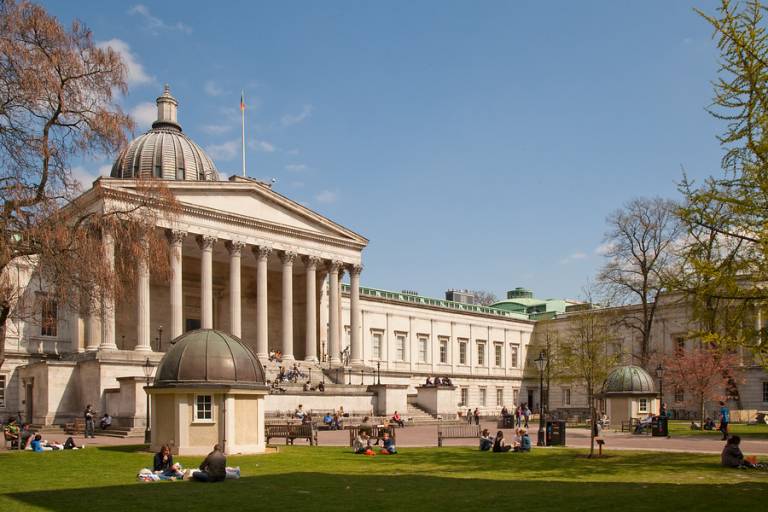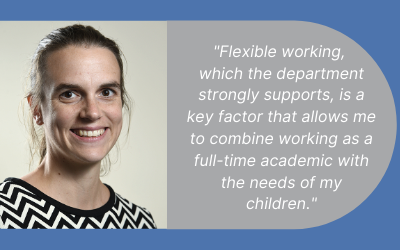Our academic, research and professional staff are the driving force of this department. Find out what to expect from a career at UCL Medical Physics and Biomedical Engineering
Our current vacancies
Work-life balance
UCL acknowledges that its staff are most productive when they have achieved a work-life balance that enables them to meet their responsibilities outside work. We have policies in place to enable flexible working when possible, and to consider requests for flexible working for any reason. We also facilitate flexible working such as flexitime, annualised hours, term-time working, shift working, staggered hours, job share/job splitting, part-time working, compressed hours, career breaks and planned remote working. Find out more about UCL-wide benefits and opportunities here:
At the Department of Medical Physics and Biomedical Engineering, we are dedicated to supporting our staff and students in many ways, and providing a supportive work environment for all new parents is important in promoting equality.
Parental leave
UCL provides generous maternity leave and sector-leading paternity leave, support for adoptive parents and carers, workplace nursery and parents and carers network. Find out more about child- and family care here.
Two of our staff members share how they've navigated having a family while continuing to develop their careers:
Dr Charlotte Hagen
Charlotte is a Senior Research Fellow, Lecturer and co-lead of the Advanced X-ray Imaging (AXIm) group alongside four other Principal Investigators. She joined the department back in 2010 as a PhD student and decided to stay as a postdoc for a few years afterwards. "Those postdoc years were extremely important for me", says Charlotte, "my projects gave me creative freedom, I was working largely independently which I enjoyed, and so I concluded that a research career would be for me. At the same time, I became increasingly unsatisfied with being employed on fixed-term contracts, not only but also because I wanted to start a family. I knew I had to apply for a fellowship if I wanted to sustain my career long term. Fortunately, my second postdoc project was funded for several years, which gave me sufficient security to pursue both of my goals, start a family and apply for fellowships. Both has paid off – my first child was born in 2017, and I ended up interviewing for a RAEng Research Fellowship in the first week after returning from maternity leave. I was successful and started the Fellowship in early 2018. My second child was born in 2020."Now a full-time academic, Charlotte works mostly flexibly by making use of UCL’s core hours philosophy: being present on campus or online when working remotely between 10 am and 4 pm; outside these times, work hours vary. Charlotte says, "This enables me to pick up my children from their childcare setting and give them my full attention until their bedtime, while still being able to dedicate sufficient time to my research and other academic work. Flexible working, which the department strongly supports, is a key factor that allows me to combine working as a full-time academic with the needs of my children."
Dr Adam Gibson
Adam joined the department in 2001 as a Postdoctoral Research Associate, working on a project to develop a novel technique for imaging the brain, breast, and other organs using laser light. Three years later, he obtained an EPSRC Advanced Fellowship which involved extending his previous research work into tools for imaging the brains of newborn infants in intensive care.
Adam’s son was born in January 2006, and soon after returning to UCL after a period of paternity leave, Adam arranged with his Head of Department to switch to part-time status (0.8FTE) with an agreement that he would be able to spend one day per week working from home. This arrangement has existed ever since. Staff and students are made aware that Adam is typically at UCL from Wednesday to Friday, but is usually available via email and phone during certain periods on Mondays and/or Tuesdays.
Meanwhile, in 2008 Adam was awarded a highly prestigious grant under the EPSRC Challenging Engineering Scheme, and the part-time arrangement was fully approved by the funding body. This award coincided with his very well-deserved promotion to Reader.
Learn more & apply
You can find out more about UCL's application process and information for EU applicants in the application FAQs page.
For a full list of resources, information, staff benefits and current vacancies across the whole of UCL, please visit the Jobs at UCL page. You'll find our current vacancies at the top of this page.
 Our current vacancies
Our current vacancies
 Close
Close




